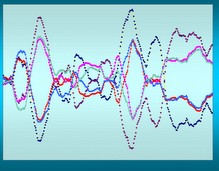... watching a company do all the right things, turn in a great quarter that beats expectations and watching it go down.This was in response to something Dogwood wrote in the contest post. And it hit a chord with me. Why does a company go down in those circumstances? For that matter what causes a stock to rise in the first place?
Most often it is "beta." Here is the definition of "beta" - The Beta coefficient, in terms of finance and investing, is a measure of a stock (or portfolio)’s volatility in relation to the rest of the market. Beta is calculated for individual companies using regression analysis. If you do not understand beta you should learn it - here is a Wikipedia article that is a must read even if it bores the crap out of you - and here is my challenge - if you don't read it - you are only a wannabe trader.
Stocks rise and fall with the market as a whole. One bad report by INTC can take the entire semiconductor industry down and when the semi's go down the entire tech sector (which includes a whole slew of stocks that have nothing to do with semiconductors) drops in sympathy, empathy, or just plain fearathy. Now just because INTC is having a bad quarter does that mean every semi manufacturer is having a bad quarter? No. But INTC is the bell weather stock and when INTC rings the bell the world sits up and takes notice.
As seen over and over again fund managers are followers not leaders. They will dump all of their semi conductor holdings in an instant at any price rather than risk a loss greater than the other guy who dumped his. All they have to see is "everyone else is doing it."
Sometimes, not always, but sometimes the sell off is precipitated by nothing at all but the fact that a fund manager is rebalancing the portfolio and finds himself in a hypothetical "overweight" position in a given stock and begins selling. Why is he rebalancing - the beta is changing in the portfolio.
The "conventional wisdom" on the street is "sell on the news buy on the rumor." Except don't believe it. There is more selling done on the rumor than ever happens on the news. Let's face it - the last one standing is not called the bag holder for nothing and the bag holder is usually the one who loses his job. The credo of every fund manager walking is - "I can buy it back tomorrow and probably cheaper."
Then there is the dead money. These are stocks that don't pay anything for you to hold them - neither a dividend nor are they matching their previous beta and that is death in a portfolio. You put a stock in the portfolio to enjoy its gains not to babysit it.
Another reason why a stock might fall in the face of good news is because the fund managers perceive the stock to have hit the top. In other words that great quarter and great report and great everything else is looked on as the swan song and absolutely no one believes that going forward this stock will ever meet that mark again. To put it simply - they don't believe it can maintain beta. So they will start to dump it early rather than wait for the rush to the exit.
My recommendation - if you are ever going to enter a stock picking contest - always select high beta, high volume stocks to either buy or sell. Otherwise you are putting yourself at a disadvantage. And in earnings season - always short tech.

No comments:
Post a Comment